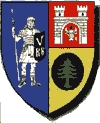Ocna Mureș: Difference between revisions
Biruitorul (talk | contribs) M |
Biruitorul (talk | contribs) Fix |
||
| Line 15: | Line 15: | ||
}} |
}} |
||
'''Ocna Mureș''' ({{IPA-ro|ˌokna ˈmureʃ}}; {{lang-la|Salinae}}, {{lang-hu|Marosújvár}}, {{lang-de|Miereschhall}}) is a [[town]] in [[Alba County]], [[Romania]], located in the north-eastern corner of the [[county]], near the [[Mureș River]] |
'''Ocna Mureș''' ({{IPA-ro|ˌokna ˈmureʃ}}; {{lang-la|Salinae}}, {{lang-hu|Marosújvár}}, {{lang-de|Miereschhall}}) is a [[town]] in [[Alba County]], [[Romania]], located in the north-eastern corner of the [[county]], near the [[Mureș River]]. The town is situated next to a large deposit of [[salt]], mined in the past until the ceiling of the mines collapsed from water infiltration in 1978. Ocna Mureș has a chlorosodic products plant,a salt extraction plant and a [[destination spa|spa]] which uses the salty water from the former mines. |
||
The town administers five villages: Cisteiu de Mureș (''Magyarcsesztve''), Micoșlaca (''Miklóslaka''), Războieni-Cetate (''Székelyföldvár''), Uioara de Jos (until 1965 ''Ciunga''; ''Csongva'') and Uioara de Sus (''Felsőmarosújvár''). |
The town administers five villages: Cisteiu de Mureș (''Magyarcsesztve''), Micoșlaca (''Miklóslaka''), Războieni-Cetate (''Székelyföldvár''), Uioara de Jos (until 1965 ''Ciunga''; ''Csongva'') and Uioara de Sus (''Felsőmarosújvár''). |
||
| Line 29: | Line 29: | ||
|1992 |16256 |
|1992 |16256 |
||
|2002 |15697 |
|2002 |15697 |
||
|2011 | |
|2011 |13036 |
||
}} |
}} |
||
According to the [[Demographics of Romania|census from 2011]] there was a total population of |
According to the [[Demographics of Romania|census from 2011]] there was a total population of 13,036 people living in this town. Of this population, 83.46% are ethnic [[Romanian people|Romanians]], 9.31% are ethnic [[Hungarian people|Hungarians]] and 7% ethnic [[Romani people|Romani]].<ref>{{cite web|url=http://www.edrc.ro/recensamant.jsp?regiune_id=2568&judet_id=2569&localitate_id=2578|title=Structura Etno-demografică a României|website=Edrc.ro|accessdate=8 October 2017}}</ref> |
||
==See also== |
==See also== |
||
| Line 48: | Line 48: | ||
[[Category:Mining communities in Romania]] |
[[Category:Mining communities in Romania]] |
||
[[Category:Monotowns in Romania]] |
[[Category:Monotowns in Romania]] |
||
{{Alba-geo-stub}} |
{{Alba-geo-stub}} |
||
Revision as of 22:47, 18 April 2020
Ocna Mureș | |
|---|---|
 | |
 Location in Alba County | |
| Coordinates: 46°23′24″N 23°51′36″E / 46.39000°N 23.86000°E | |
| Country | Romania |
| County | Alba |
| Government | |
| • Mayor | Silviu Vințeler[1] (PNL) |
| Area | 68.34 km2 (26.39 sq mi) |
| Population (2021-12-01)[2] | 12,480 |
| • Density | 180/km2 (470/sq mi) |
| Time zone | EET/EEST (UTC+2/+3) |
| Vehicle reg. | AB |
Ocna Mureș (Romanian pronunciation: [ˌokna ˈmureʃ]; Latin: Salinae, Hungarian: Marosújvár, German: Miereschhall) is a town in Alba County, Romania, located in the north-eastern corner of the county, near the Mureș River. The town is situated next to a large deposit of salt, mined in the past until the ceiling of the mines collapsed from water infiltration in 1978. Ocna Mureș has a chlorosodic products plant,a salt extraction plant and a spa which uses the salty water from the former mines.
The town administers five villages: Cisteiu de Mureș (Magyarcsesztve), Micoșlaca (Miklóslaka), Războieni-Cetate (Székelyföldvár), Uioara de Jos (until 1965 Ciunga; Csongva) and Uioara de Sus (Felsőmarosújvár).
The spa is no longer running. The chemical plant in town was lastly purchased by an Indian company from a company based in Timișoara. Currently the plant has ceased activity. The majority of high school students attend either Liceul Teoretic Petru Maior or the 'Chemistry School,' where many are trained to later work for the factory in town. Exceptional students progress onto University studies, generally in nearby Cluj-Napoca or Alba Iulia, the county capital. The downtown was relocated after the mine was flooded as the ground became unstable. Now this area is filled with more than 4 large, very deep lakes. The center of town is now at the base of a large hill, the 'Banța.'
Demographics
| Year | Pop. | ±% |
|---|---|---|
| 1956 | 10,701 | — |
| 1966 | 12,126 | +13.3% |
| 1977 | 16,416 | +35.4% |
| 1992 | 16,256 | −1.0% |
| 2002 | 15,697 | −3.4% |
| 2011 | 13,036 | −17.0% |
| Source: Census data | ||
According to the census from 2011 there was a total population of 13,036 people living in this town. Of this population, 83.46% are ethnic Romanians, 9.31% are ethnic Hungarians and 7% ethnic Romani.[3]
See also
References
- ^ "Results of the 2016 local elections". Central Electoral Bureau. Retrieved 3 April 2020.
- ^ "Populaţia rezidentă după grupa de vârstă, pe județe și municipii, orașe, comune, la 1 decembrie 2021" (XLS). National Institute of Statistics.
- ^ "Structura Etno-demografică a României". Edrc.ro. Retrieved 8 October 2017.



